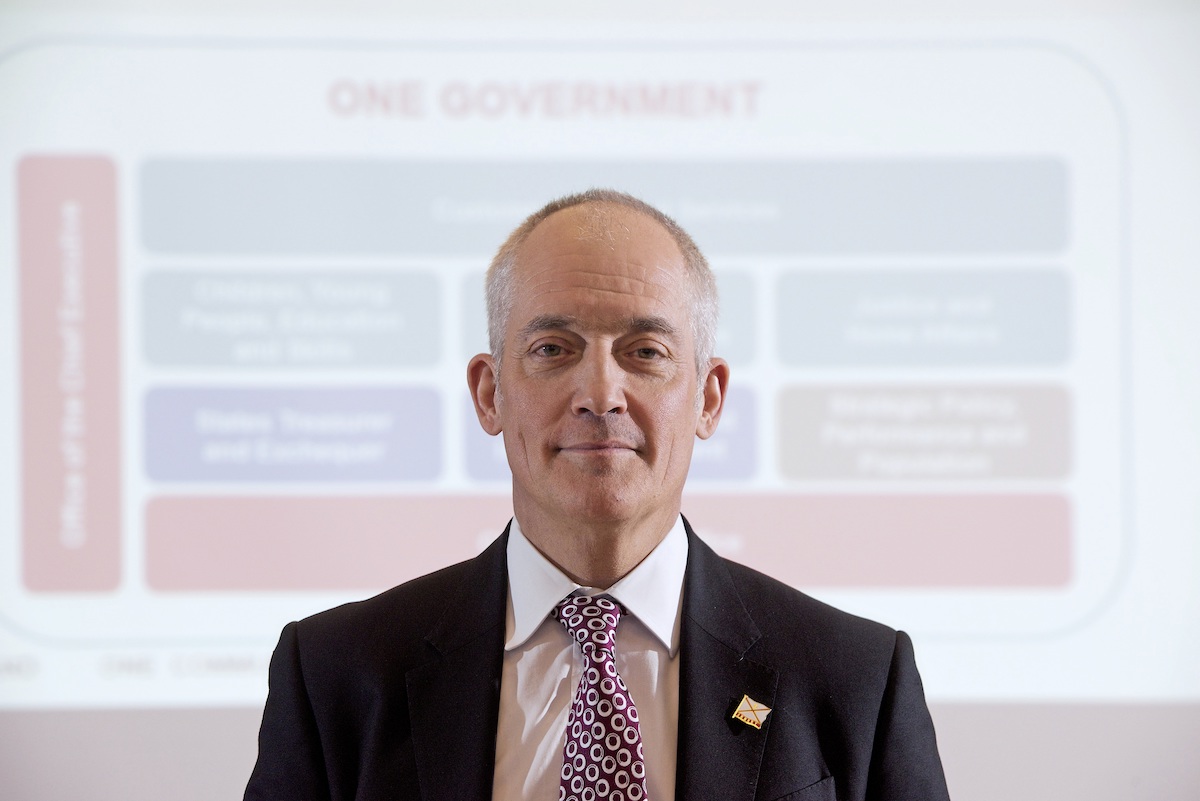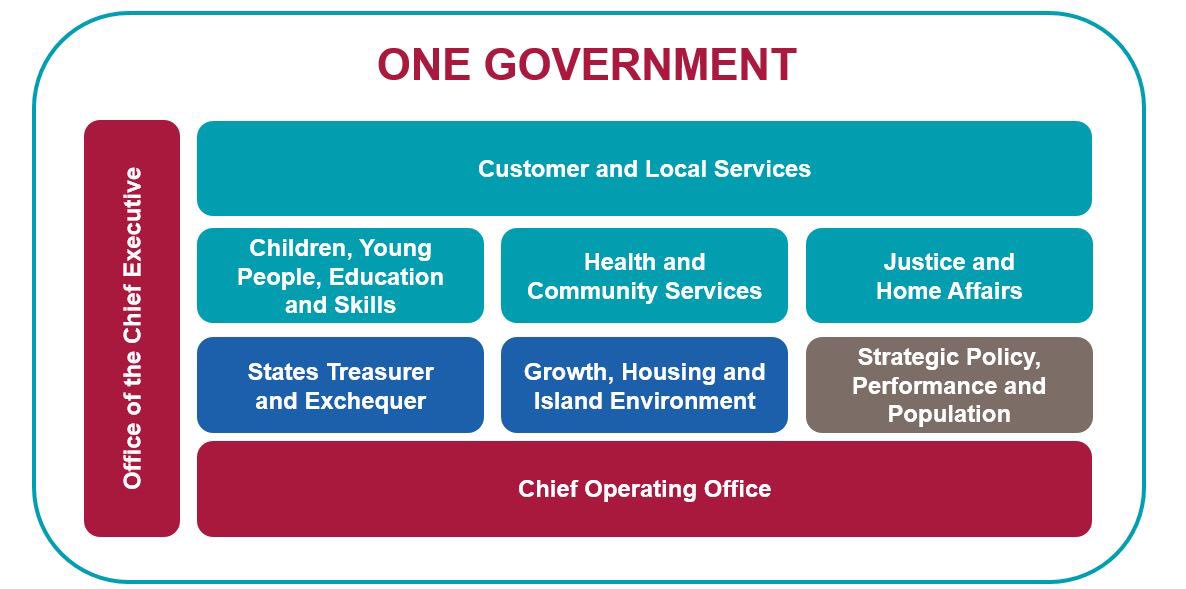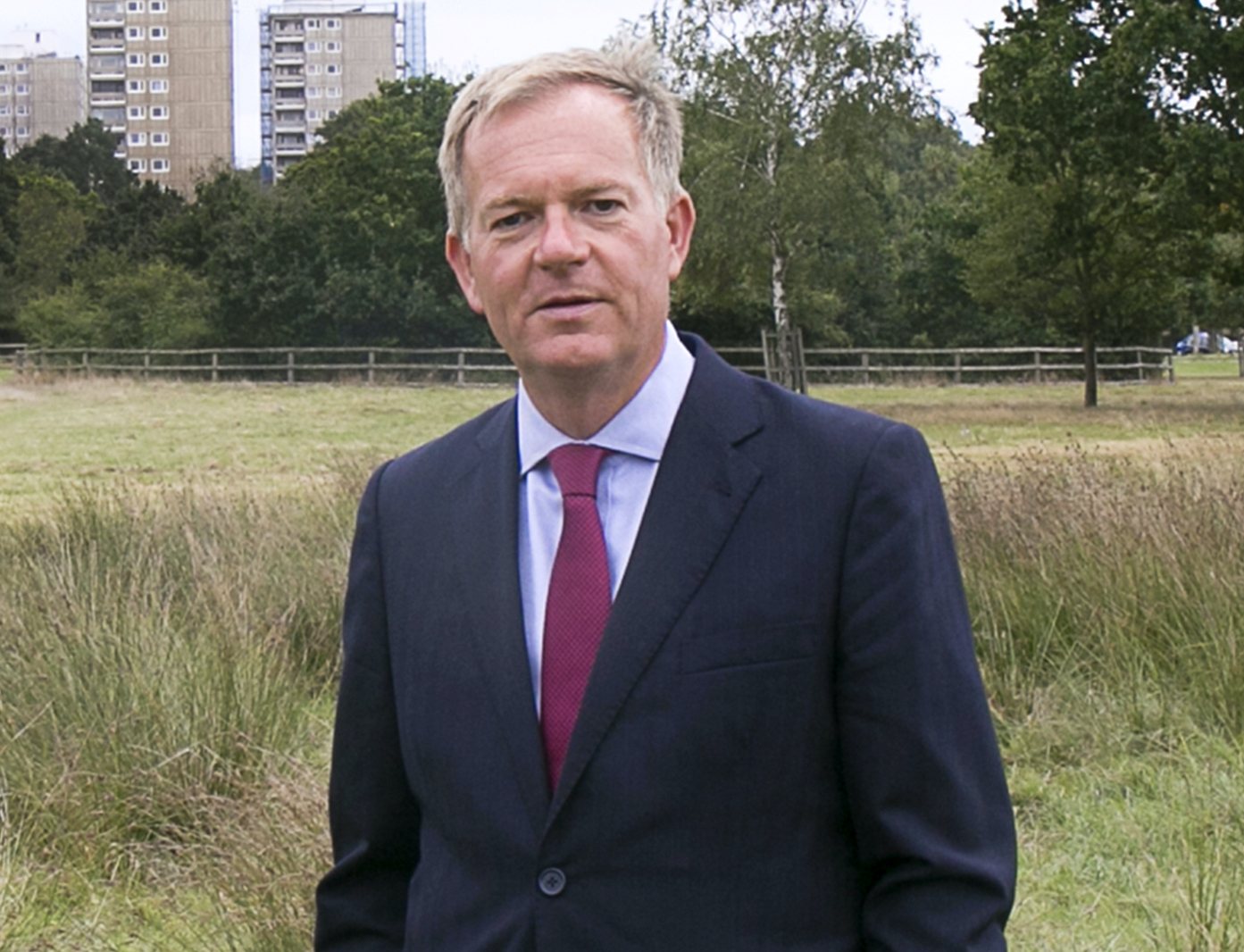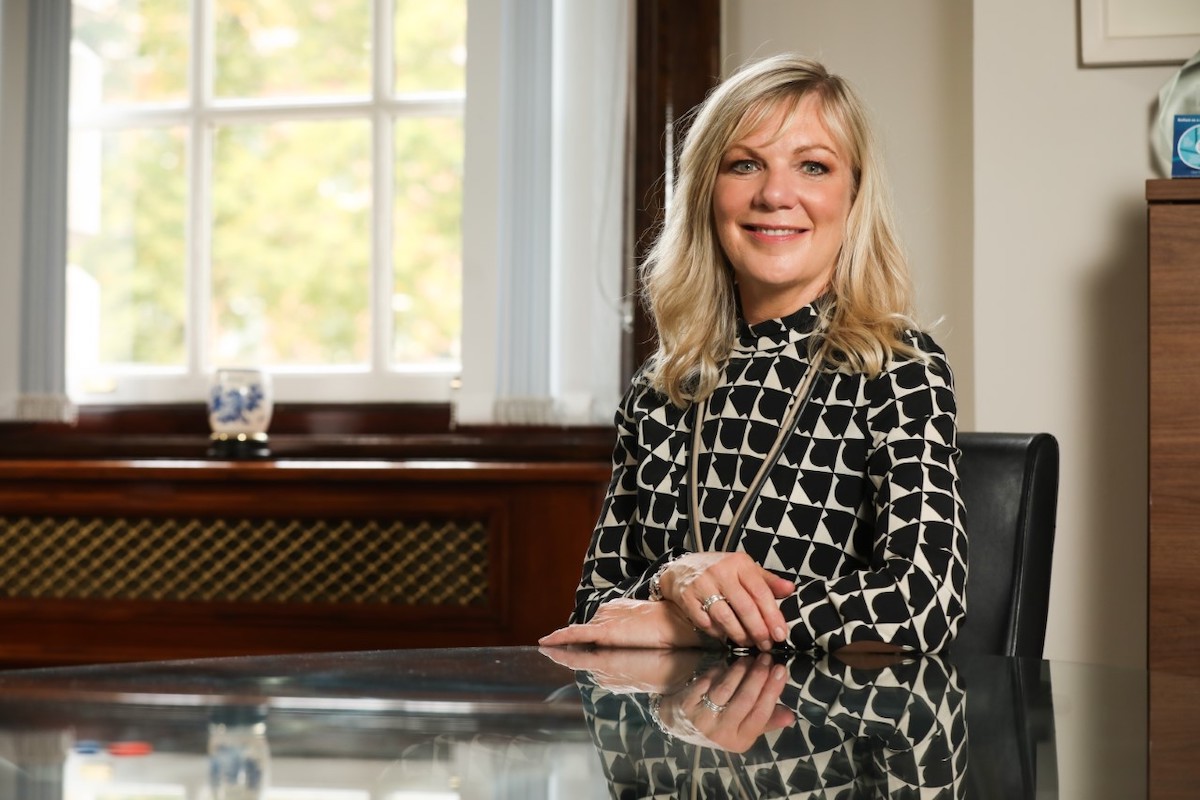


The shock departure of Government CEO Suzanne Wylie after little more than a year in the role is the most recent in a long line of controversies surrounding the island's most senior civil servant job.
Established in 2003, the role of the government's Chief Executive currently boasts a £250,000 salary, but also appears to be plagued by political squabbles — with all three of Mrs Wylie's permanent predecessors leaving the top job with compromise agreements that led to reports by the Comptroller and Auditor General.
Join Express as we look back on the drama that seems to have followed every person who has stepped up to the role...
John Richardson took up the role as Government Chief Executive in 2012, having already been in that role for a year on an interim basis following the departure of Bill Ogley.
Mr Ogley — who become Jersey's first ever Chief Executive in 2003 when the role was created — left the job in 2011 with an unprecedented pay-off of around £550,000. It was later reported that he left following a "sustained period of interference and harassment" by the Deputy Chief Minister and Treasury Minister at the time, Philip Ozouf.
There was also controversy surrounding Mr Richardson's full-time appointment to the Chief Executive role in 2012. He was initially appointed on a three-and-a-half year fixed-term contract, which was extended by a further two-and-a-half years in 2015.
However, it was then suggested that the decision to appoint Mr Richardson on a full-time basis did not follow normal procedures set out by the Jersey Appointments Commission — an independent body tasked with overseeing the appointment of senior civil servants.

Pictured: John Richardson took up the role as Government Chief Executive in 2012.
According to the States 2016 Accounts, Mr Richardson's salary was up to £210,000 a year with total renumeration up to £239,000, and a States pension pot of at least £3million (as at end of 2016) — making him the fourth most highly remunerated States employee at the time.
After 35 years of public service, Mr Richardson eventually left the CEO post six months early with a severance package believed to total in the region of £230,000.
Mr Richardson was said to have asked to leave early, to avoid any "confusion" caused by overlapping with the incoming Chief Executive Charlie Parker.
He left the States on the 2 November 2017 after 35 years of public service — originally, it was planned that he would exit in May 2018.
Perhaps the most divisive Government CEO, Charlie Parker took on the role as Jersey's top civil servant in January 2018.
Among his contract perks were getting 'quallies' - entitled residential status, which people ordinarily have to earn by living in Jersey for 10 years, allowing him to buy and sell property locally. Another perk was that he was effectively able to write his own job description - later, it emerged that the company tasked with evaluating his performance had worked with him before.
He had been holding informal meetings in the island since his appointment was announced in July 2017, and began to take up the reins on a phased basis from November 2017.
He was supported by then Treasurer of the States, Richard Bell, who had operational responsibility until Mr Parker was permanently in post in January 2018 - as well as a 'Transition Team' of four UK consultants who came to be known as 'Charlie's Angels'.
While the group, who together cost taxpayers' more than £430,000 in six months, were only supposed to be 'interim' appointments, two ended up taking on full-time roles in Jersey's government with salaries of more than £100,000 each.
Just a few months into the role, Mr Parker unveiled his 'OneGov' plan to tear up, merge and create new departments to make government more efficient.

Pictured: Former Chief Executive, Charlie Parker.
Revealed shortly before elections in March 2018, it remains the biggest single reform to the island's government in living memory.
He said at the time that "there will be casualties", but pledged that these would lead to staff savings of more than £1m a year. However, it emerged last year that government headcount had swelled by more than 1,000 after 'OneGov'.
Mr Parker also faced criticism for failing to reveal the amount spent on the major 'OneGov' reform project.
Among the most significant costs of the OneGov programme at the time were the £3.5million recruitment of UK firm TDP to ‘change the culture’ in the public sector, and the move to the new Broad Street headquarters.

Pictured: The OneGov structure originally proposed by Charlie Parker.
In October 2020, Mr Parker came under fire when it emerged that he had taken on a £50,000 second job as a non-executive director at a real estate company with a £1.2bn portfolio.
His appointment at NewRiver Reit PLC was made effective in late September 2020 following approval from the Chief Minister and Deputy Chief Minister.
However, it later emerged that the CEO had not followed the proper process for getting permission for the second job - which should have been granted by the States Employment Board, as per the terms of his contract, which Express revealed in 2018.

Pictured: The relevant part of Mr Parker's contract, which was made public by Express.
Email chains unearthed by Express also disproved a pledge that Mr Parker would only work on his second role in his spare time.
Mr Parker's departure from the Government Chief Executive job was confirmed in November 2020 after the SEB came to conclusion that his £50,000-a-year non-executive director role at UK real estate firm New River was “not compatible” with his local role.
Announcing his exit in a public letter to the Chief Minister, he said he would stay “for as long as the government requests me to.”
CLICK TO READ: Mr Parker's resignation letter.
Following a handover period to Interim CEO Paul Martin, Mr Parker officially left his role on 31 March 2021.
In May 2021, it was revealed that Mr Parker was given a half-a-million 'golden handshake' by the government to avert legal action over his early departure – contrary to rules covering how public money should be handled.
It was revealed that the compromise agreement sum, which exceeded the payout for early departure laid out in his original employment contract, was agreed by the States Employment Board (SEB) and Mr Parker on 12 November 2020.
Signed just two weeks after the row over his second job at UK real estate firm New River broke out, the deal set the official end date of Mr Parker’s employment on 31 December 2020. A second, fixed-term contract was then put in place for 8 January to 31 March 2021.
Mr Parker received his payout on 29 January 2021.
Then-Chief Minister, John Le Fondre declined to share what claims the government would have otherwise been forced to fight when asked by Express.
Finding a new CEO and Interim Chief to lead Jersey's civil service in the wake of Mr Parker's departure subsequently cost the island more than £160,000 in recruitment fees.
Former head of Wandsworth and Richmond Boroughs, Paul Martin was appointed as Chief Executive on a 12-month temporary contract after Charlie Parker's departure.

Pictured: Mr Parker's first successor was interim CEO Paul Martin, who was appointed after a process that cost £95,000.
It was confirmed that the Interim CEO role would not come with a pension or 'quallies', and Mr Martin would only be entitled to rent property. However, he was given a £500 taxable rent allowance and the government also paid for his family’s relocation costs to the island.
Mr Martin officially joined the Government of Jersey on 1 March 2021, which allowed for a handover period with predecessor Mr Parker who left on 31 March 2021.
In June 2021, scrutineers called for the recruitment of the new permanent CEO to be delayed until after the elections in case there is an influx of new political leaders with different priorities.
The Corporate Services Scrutiny Panel wrote to then-Chief Minister, Senator John Le Fondré, calling for the final appointment to be pushed back until after the election in June 2022.
At the time, the then-Senator Kristina Moore argued that delaying the recruitment until a new Council of Ministers is in place would "avoid a repeat of the previous recruitment process" during which Mr Parker took up his new role just months before the 2018 elections brought in a new Chief Minister with different priorities.
However, this attempt to delay the appointment of the next Government CEO failed after States Members were told that it would be unlawful.
Deputy Kirsten Morel praised Interim CEO Mr Martin who he said had done much to reverse the “cronyism, diminishment of status of the Assembly and lack of understanding in Jersey” that he believed had typified the previous leadership.
When his 12-month temporary contract ended, it was confirmed that Mr Martin did not apply for the permanent CEO role. He left the island in 2022 to take up a job as Interim CEO of the London Borough of Ealing.
Former Chief Executive Officer of Belfast City Council, Suzanne Wylie was announced as Jersey government's first female Chief Executive in September 2021.
She took up her position in Jersey in February 2022, having beaten off competition from nearly 70 applicants for the role.
In an Express Interview in February 2022, Mrs Wiley stated that she chose to take up the role in Jersey due to the "scale, and breadth, of the role" as well as "the fact that Jersey is a unique place with a real pride in its culture, way of life, and wonderful heritage."
She also added that Jersey and Belfast has a number of similarities. Specifically, she mentioned: "Northern Ireland has a very distinct identity which is hugely important to its people. It's geography also leads to skills and labour shortages in key sectors, and issues with retention of young people."
She also mentioned the similarity of the people: "I see a similarity in the spirit of the people and what they hold dear - community, family, way of life, identity, heritage and environment."

Pictured: Suzanne Wylie was Jersey's first female Government CEO.
Once in the role, Wylie found herself playing a crucial role in creating the new Cabinet Office, one of the key tenets of the Chief Minister's '100-day plan', which brought together the Office of the Chief Executive (OCE), the Chief Operating Office (COO), and Strategic Policy, Planning and Performance (SPPP) into a combined department with a new leadership team.
The Cabinet office was set up in an effort to roll back the 'OneGov' reforms made under previous CEO Charlie Parker, which a review claimed resulted in "an imbalance of power between the Chief Executive/Civil Service" and politicians, leading to a "lack of political accountability for decisions."
Mrs Wylie also commissioned a review into allegations of bullying at the General Hospital in October 2022. An anonymous letter claimed that bullying, collusion and mismanagement "brought out hospital to its knees and literally to the point of complete collapse." The letter included allegations of bullying of doctors and the appointment of “incompetent” specialists.
The review was completed in January, and Mrs Wiley announced that some incidents would be investigated further. Just last week, it was announced that the Director General of Health and the island's Chief Nurse will be stepping down at the end of the month.
This month, the Chief Minister admitted to States Members that no performance metrics had been finalised for Chief Executive Mrs Wylie in spite of a government pledge to complete the task by the end of February.
Deputy Lyndsay Feltham, Chair of the Public Accounts Committee, said her committee had been “surprised and concerned” to learn from Mrs Wylie at a hearing at the start of February that her KPIs were not finalised, in spite of her having been in post for a year.
In light of her resignation, after little over a year in office, Mrs Wylie will now be retuning to Northern Ireland to take up the role of CEO of the Northern Ireland Chamber of Commerce.
Suzanne Wylie, the former Chief Executive of Belfast City Council and more recently Chief Executive of the Government of Jersey has been appointed as the new Chief Executive of @NIChamber.
— NIChamberofCommerce #heretohelp (@NIChamber) March 22, 2023
Suzanne will succeed @annmcgregor this summer. pic.twitter.com/JnZucUjeLJ
An announcement on the NI Chamber website confirmed that she is expected to take up the role in summer this year.
Gov in crisis as CEO Suzanne Wylie resigns
Comments
Comments on this story express the views of the commentator only, not Bailiwick Publishing. We are unable to guarantee the accuracy of any of those comments.